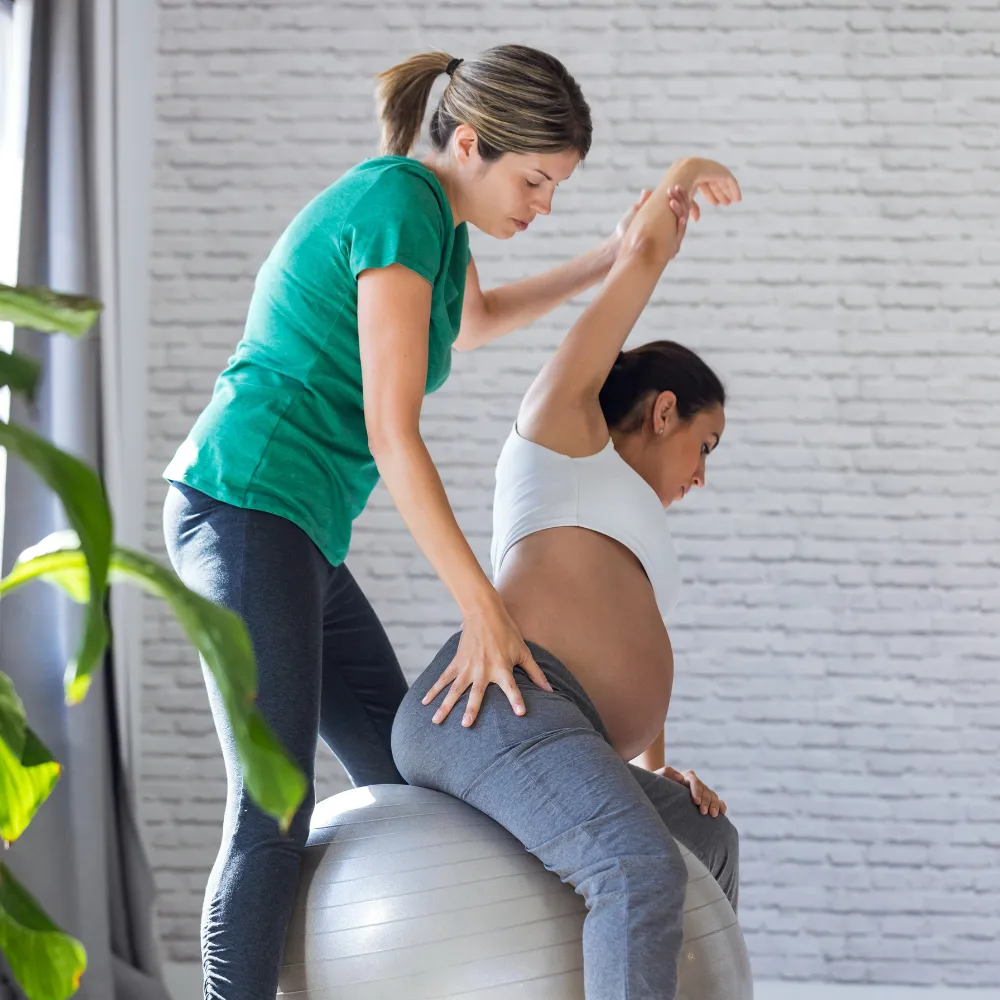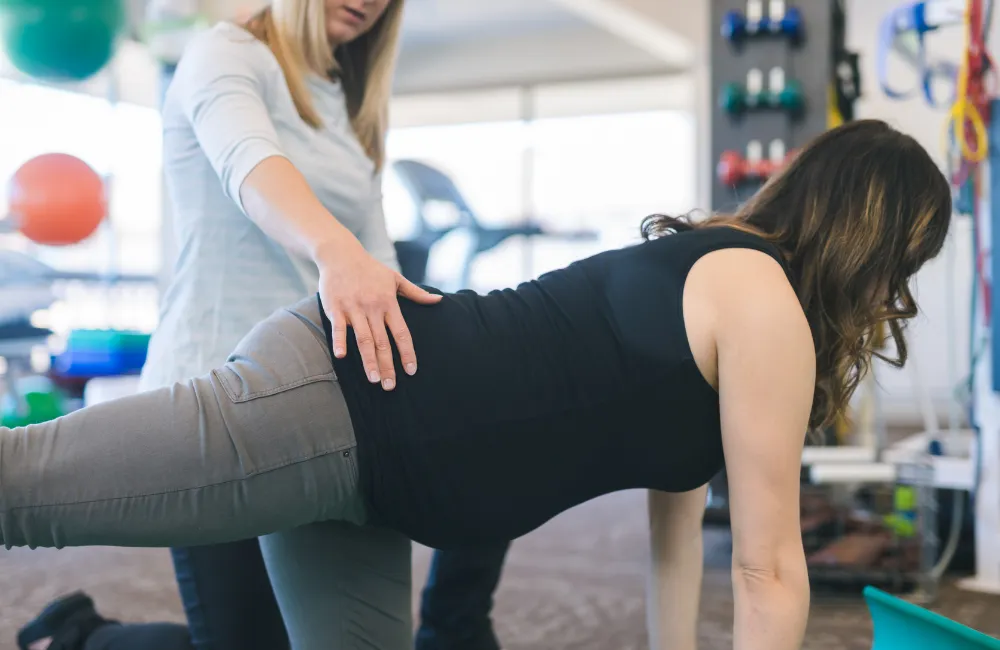Pregnancy and motherhood are beautiful journeys, but they come with physical changes like back pain, pelvic discomfort, and the need for guided recovery after birth. At Vesta Care, we bring expert prenatal and postnatal physiotherapy straight to your home, ensuring you stay healthy, comfortable, and supported. Our DHA-licensed women’s health physiotherapists have over 20 years of experience helping mothers in Dubai. We understand the unique needs of pregnancy and postpartum recovery, offering gentle, evidence-based care that eases discomfort, prepares your body for labor, and speeds up healing—all in the privacy of your home.



.svg)


Prenatal physiotherapy helps women manage the physical changes and discomforts of pregnancy, including back pain, pelvic strain, and postural shifts. Postnatal physiotherapy supports new mothers in regaining core strength, improving pelvic floor function, and restoring overall health. During pregnancy, weight gain, a shifting center of gravity, hormonal changes, and added stress on the spine, pelvis, and joints affect your body. After delivery—whether vaginal or cesarean—healing is needed for weakened abdominal and pelvic muscles, diastasis recti, scar tissue, and postural strain from carrying and feeding the baby. Physiotherapy helps restore strength, mobility, and confidence during this period.
We can help with discomfort in the lower back and pelvic girdle, the hips and round ligaments, the ribs and upper back, the neck and shoulders, sciatica and nerve pain, and pubic symphysis dysfunction (SPD) during pregnancy.
Getting Your Pelvic Floor Ready: Strengthening and preparing your pelvic floor muscles for labor and delivery lowers the chance of issues, helps you become more aware of and in control of your pelvic muscles, supports the ideal position for birth, and minimizes the risk of problems following birth.
Core Stability and Strength: You can keep your core strong during pregnancy by doing safe abdominal exercises, learning how to stand up straight, breathing techniques and balancing and stability work.
Preparing for Labor: We show you how to breathe and relax, how to get into the optimal posture for labor, and how to push without hurting your pelvic floor.
Pregnancy-Related Conditions: Our specialized care can help with carpal tunnel syndrome, swelling and edema, diastasis recti that happens throughout pregnancy, and rib flaring.


We do a home evaluation tailored to your pregnancy or postpartum stage, checking posture, movement, pelvic floor, abdominal separation, and discussing your goals.
We create a custom plan based on your trimester or postpartum stage, type of delivery, symptoms, activity level, and preferences.
Manual Therapy: Gentle hands-on techniques like soft tissue massage, joint mobilization, scar tissue care, myofascial release, and lymphatic drainage to ease tension and swelling.
Therapeutic Exercise: Tailored programs with pelvic floor and core strengthening, breathing exercises, posture improvement, stretching, and functional movements.
Education: Guidance on body mechanics during and after pregnancy, safe lifting and baby care, activity modification, recovery expectations, and when to consult a doctor.
Schedule a consultation at home. Our physiotherapist reviews your medical history, pregnancy stage or postpartum condition, current symptoms, and lifestyle to understand your unique needs.
We create a tailored program that addresses your pain, muscle imbalances, core and pelvic floor strength, posture, and overall mobility.
For expecting mothers, we focus on relieving back and pelvic pain, improving posture, maintaining strength, and preparing your body for labor.
After childbirth, we help restore core stability, pelvic floor function, posture, and overall fitness, including management of diastasis recti and scar tissue.
You receive exercises to safely perform between visits, reinforcing therapy, improving strength, and preventing future discomfort.
We teach strategies for safe movement, injury prevention, proper lifting and carrying techniques, and lifestyle adjustments to support your ongoing health and recovery.
.svg)
Experience You Can Trust: Over 20 years serving families in Dubai, understanding cultural differences, expatriate needs, extended family dynamics, and the local healthcare system.
.svg)
Certified Experts: DHA-licensed physiotherapists with specialized training in prenatal and postnatal care, delivering compassionate, professional treatment. You can also get post-natal nursing care at home with Vesta Care.
.svg)
Home Comfort & Privacy: Receive care at home without travel, with private sessions, baby-friendly accommodations, and exercises using familiar surroundings.
.svg)
Flexible Scheduling: Appointments tailored around feeding times, sleep patterns, partner availability, and last-minute changes for convenience.
.svg)
Ongoing Support: Continuous care throughout pregnancy, postpartum recovery, and return to daily activities, adapting as your needs evolve.
Vesta Care provides prenatal and postnatal physiotherapy in all of Dubai, including Downtown Dubai, Dubai Marina, Jumeirah, Palm Jumeirah, Business Bay, Arabian Ranches, Dubai Hills, JBR, DIFC, Dubai Silicon Oasis, and every other area in Dubai.


Don’t face the physical challenges of pregnancy and postpartum alone. Whether it’s pregnancy discomfort, preparing for labor, or healing after birth, Vesta Care’s expert physiotherapy helps you feel stronger, more comfortable, and confident in your changing body.
Our caring team provides evidence-based, personalized care in the comfort and privacy of your home, supporting your health and well-being every step of the way.
Call Vesta Care today for a free assessment and discover how our prenatal and postnatal physiotherapy can help you during pregnancy and beyond.
Your first session typically lasts 60 minutes and includes a comprehensive evaluation, which features a detailed discussion of your pregnancy history, delivery details (for postnatal), current symptoms and concerns, your goals and expectations, and any medical issues, as well as a physical exam of the affected areas. This exam assesses your posture and movement, identifies the location and triggers of your pain, evaluates the pelvic floor (postnatal, with consent), examines the abdominal muscles, and reviews functional movement. Then, we design a treatment plan particularly for you, and we usually start some light treatment in the first appointment. To begin, you'll learn about your illness and obtain some exercises to do at home. Put on garments that are easy to move in and that let you get to your back and stomach. You can take your baby to postnatal visits. We will work around their needs for food and care. Our home environment makes the assessment peaceful and confidential, without the stress of going to the doctor's office.
You require special care after a C-section because it is a big surgery on the stomach. Physiotherapy helps by shifting scar tissue around to stop adhesions and make things more flexible. It also helps restore the function of abdominal muscles that were cut during surgery, deal with compensatory movement patterns that developed while protecting the incision, manage pain around the surgical site, safely and gradually rebuild core strength, and stop long-term problems like chronic pain or reduced abdominal function. We normally start working on the scars gently 6 to 8 weeks after the baby is born, when the incision has healed. A lot of ladies are astonished with how much scar mobilization helps them recover and get rid of the "shelf" feeling above the cut. Scar tissue work can benefit even years after a cesarean. It's challenging to travel in the first few weeks after giving birth, so our home-based care makes it easier to heal from a C-section.
If done correctly, exercising while pregnant is usually safe and good for you. Our prenatal physiotherapy includes advice on safe exercise, such as which activities to keep doing or change, how difficult to work out, which exercises to avoid (like heavy lifting, high-impact activities, and some core exercises), warning signs that you should stop working out, and changes that are specific to each trimester. Exercise during pregnancy can help with back pain, mood, and energy levels, as well as sleep, labor and delivery, and recuperation after birth. It can also help you avoid getting gestational diabetes and gaining too much weight. We develop exercise plans particularly for you depending on your fitness level before you got pregnant, any challenges you had throughout pregnancy, your trimester, and any unique symptoms or worries you have. You shouldn't hurt or get exhausted when you work out. Our physiotherapists make sure that you and your infant are safe while you work out.
Diastasis recti happens when the rectus abdominis muscles in the stomach pull apart. This happens a lot when you're pregnant to give the baby more room to grow. It's natural for the belly to separate during pregnancy, but if it stays that way after the baby is delivered, it can create a protruding belly, lower back pain, pelvic floor dysfunction, and weak core muscles. Physiotherapy is very helpful for treating diastasis recti because it includes a proper assessment to measure the separation, specialized exercises to bring the muscles back together, teaching people which movements to avoid, functional training for daily activities, and progressive core strengthening. The appropriate form of physiotherapy makes most situations a lot better. We look for diastasis recti in all new mothers and develop preparations to repair their abdominal wall. Using the appropriate technique is the most crucial factor. It's crucial to receive professional advice because not all core workouts are safe for people with diastasis recti.
How you gave birth and how quickly you heal will determine when you can start. You can start doing gentle exercises that focus on breathing, activating the pelvic floor, and posture within days following an uncomplicated vaginal birth. Usually, more active rehabilitation starts six weeks following delivery of birth. You might start moving around very slowly after a C-section. after a few days. But core work and more severe rehab normally don't start until 8 to 10 weeks later, when your body has had time to heal properly. If you had problems, needed stitches, or had a lot of ripping, your physiotherapist will work with your doctor's advice on when to start. If you start too soon, it can take longer for the wound to heal. But if you start doing the appropriate workouts early, it can help you get well faster. With our home service, you may start when you're ready without having to worry about taking care of a baby while you're away from home.
Yes, all women should get their pelvic floor assessed after giving birth, no matter how they did it. During pregnancy and childbirth, the pelvic floor has to deal with a lot of stress and stretching. Pregnancy still affects these muscles, even if the baby is born via cesarean section. A pelvic floor assessment after giving birth can help detect abnormalities, including weakness, tightness, or a risk of prolapse. It also sets a beginning point for rehabilitation, makes sure it's safe to start exercising again, and manages any current symptoms. We only check your pelvic floor with your full permission and in a respectful way. They normally start six to eight weeks after you have your baby. Many women don't realize they have pelvic floor difficulties until they try to work out again or have symptoms later. Early identification and treatment keep problems from getting worse. At Vesta Care, we make this evaluation simple and private in your own home.
You can start prenatal physiotherapy anytime, but the best time depends on your needs. Many women start in the second trimester (weeks 13–26) when their bodies start to change more and they may start to feel uncomfortable. But physiotherapy in the first trimester can help with early pregnancy symptoms, dealing with tiredness, and making beneficial habits. In the third trimester, work is all about getting ready for labor, dealing with increasing pain, and finding the optimum posture. It's a good idea to start early, even if you're not in discomfort. Taking care of yourself now can help you avoid difficulties later. Don't wait if you have back pain, pelvic discomfort, or any other kind of pain. Get cared for immediately.